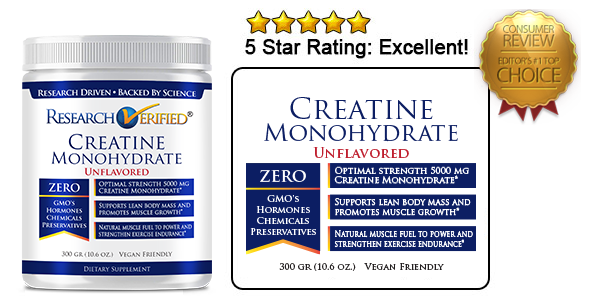Should You Take Creatine? A Comprehensive Review

Table of Contents
What is Creatine and How Does it Work?
Creatine is a naturally occurring organic acid primarily found in skeletal muscle. Its primary function is to replenish adenosine triphosphate (ATP), the body's primary energy source for high-intensity activities. While several forms of creatine exist (creatine ethyl ester, creatine hydrochloride, etc.), creatine monohydrate remains the most researched, safest, and most effective form available. Numerous studies confirm its efficacy and safety profile.
Creatine's mechanism of action involves several key processes:
- Increased ATP Production: Creatine supplementation increases the levels of phosphocreatine in muscle cells. Phosphocreatine acts as a reservoir for regenerating ATP, allowing for more powerful and prolonged muscle contractions during high-intensity exercises like weightlifting, sprinting, and plyometrics.
- Improved Muscle Hydration: Creatine attracts water into muscle cells, leading to increased cell volume. This "cell volumization" is thought to promote muscle protein synthesis and growth.
- Enhanced Muscle Protein Synthesis: Some studies suggest creatine may indirectly influence muscle protein synthesis, contributing to muscle growth (hypertrophy) and improved recovery.
Scientific Evidence: Numerous peer-reviewed studies support creatine's effectiveness in enhancing muscle strength, power, and size. A meta-analysis published in the Journal of the International Society of Sports Nutrition found significant improvements in strength and power output among participants supplementing with creatine.
- Increases ATP (adenosine triphosphate) levels.
- Enhances muscle power and strength.
- Promotes muscle growth (hypertrophy).
- Improves high-intensity exercise performance.
Benefits of Creatine Supplementation
The benefits of creatine extend beyond simply building muscle. It offers a range of advantages for various populations and fitness goals:
- Increased Strength and Power: Creatine significantly improves short-term, high-intensity performance, leading to gains in strength and power. This is particularly beneficial for weightlifters, sprinters, and athletes involved in explosive movements.
- Improved Muscle Mass: By enhancing muscle protein synthesis and cell volumization, creatine contributes to increased muscle mass and lean body mass.
- Enhanced Athletic Performance: The improved ATP regeneration and muscle power translate to better performance across various sports, from weightlifting and bodybuilding to team sports and endurance activities (especially those with high-intensity bursts).
- Possible Cognitive Enhancement: Although research is still ongoing, some studies suggest potential benefits for cognitive function, particularly in individuals with specific cognitive impairments. However, more research is needed to fully understand these effects.
- Faster Muscle Recovery: By improving ATP replenishment, creatine may contribute to faster muscle recovery after intense workouts, reducing muscle soreness and fatigue. This allows for more frequent and effective training.
- Benefits for Specific Populations: Vegetarians, who may have lower creatine stores, and older adults, who experience age-related muscle loss (sarcopenia), may benefit significantly from creatine supplementation.
Potential Side Effects and Risks of Creatine
While generally considered safe, creatine supplementation can cause some side effects, though they are usually mild and temporary:
- Water Weight Gain: Creatine's ability to draw water into muscle cells can lead to a temporary increase in body weight, often referred to as water weight. This is usually not a cause for concern and dissipates once supplementation ceases.
- Gastrointestinal Discomfort: Some individuals may experience mild gastrointestinal issues such as bloating, cramping, or diarrhea, especially when starting creatine supplementation or taking high doses. Gradually increasing dosage and ensuring adequate hydration can mitigate these effects.
- Rare Cases of Kidney Issues: While rare, creatine has been associated with kidney problems in individuals with pre-existing kidney conditions. Healthy individuals with normal kidney function are generally at low risk. Proper hydration is crucial to prevent potential strain on the kidneys.
- Muscle Cramps: Muscle cramps can occasionally occur, often due to dehydration. Maintaining adequate hydration is essential when using creatine.
How to Take Creatine Safely and Effectively
To maximize the benefits and minimize the risks of creatine supplementation, follow these guidelines:
- Recommended Dosage and Timing: The typical recommended dosage is 3-5 grams per day. You can take it anytime, pre-workout, post-workout, or even throughout the day.
- Importance of Hydration: Maintain adequate hydration by drinking plenty of water throughout the day, especially during and after workouts.
- Loading Phase vs. Maintenance Phase: Some individuals opt for a loading phase, taking 20 grams per day for 5-7 days to quickly saturate muscle creatine stores. Afterward, they switch to a maintenance phase of 3-5 grams daily. However, a loading phase isn't necessary for effectiveness.
- Combining with Other Supplements: Creatine can be combined with other supplements such as protein powder to support muscle growth and recovery.
Creatine vs. Other Supplements: Alternatives and Comparisons
Creatine works synergistically with other supplements, but it offers unique benefits:
- Creatine vs. Protein Powder: Protein powder supports muscle protein synthesis, while creatine enhances ATP production and muscle hydration. They complement each other.
- Creatine vs. BCAAs: Branched-chain amino acids (BCAAs) aid muscle protein synthesis and reduce muscle breakdown, while creatine focuses on energy production and strength. Both have their place.
- Creatine as part of a comprehensive fitness plan: Creatine is most effective when combined with a balanced diet, consistent strength training, and adequate rest and recovery. It's a tool to enhance performance, not a miracle solution.
Should You Take Creatine? A Final Verdict
Creatine supplementation offers a range of potential benefits for enhancing athletic performance, increasing muscle mass, and improving strength and power. When used properly, it's generally safe and effective. However, potential side effects, such as water retention and gastrointestinal discomfort, should be considered. Individual responses to creatine vary.
It's crucial to consult with your doctor or a registered dietitian before starting any new supplement regimen, especially if you have pre-existing medical conditions. Weigh the benefits and risks of creatine carefully and make an informed decision about creatine based on your individual goals and health status. Learn more about creatine supplementation and find what works best for your fitness journey!

Featured Posts
-
 Ufc 314 Aftermath Pimbletts Callout Of Ilia Topuria
May 15, 2025
Ufc 314 Aftermath Pimbletts Callout Of Ilia Topuria
May 15, 2025 -
 Tarim Kredi Koop Tan Ciftcilere Oezel Indirim 2 4 Mayis 2025 Gida Ve Temizlik Firsatlari
May 15, 2025
Tarim Kredi Koop Tan Ciftcilere Oezel Indirim 2 4 Mayis 2025 Gida Ve Temizlik Firsatlari
May 15, 2025 -
 Vont Weekend Photos From April 4th 6th 2025 Kissfm 96 1
May 15, 2025
Vont Weekend Photos From April 4th 6th 2025 Kissfm 96 1
May 15, 2025 -
 Presidential Pardons Under Trump A Wild West Of Power
May 15, 2025
Presidential Pardons Under Trump A Wild West Of Power
May 15, 2025 -
 Military Discharge Of Trans Master Sergeant Sparks Outrage Today I M Not Ok
May 15, 2025
Military Discharge Of Trans Master Sergeant Sparks Outrage Today I M Not Ok
May 15, 2025
Latest Posts
-
 4 1 Defeat Portland Timbers Fall Short Against San Jose Earthquakes
May 15, 2025
4 1 Defeat Portland Timbers Fall Short Against San Jose Earthquakes
May 15, 2025 -
 Lafc Shifts Focus To Mls San Jose Clash
May 15, 2025
Lafc Shifts Focus To Mls San Jose Clash
May 15, 2025 -
 Bassetts Goal And Steffens 12 Saves Secure Rapids Win
May 15, 2025
Bassetts Goal And Steffens 12 Saves Secure Rapids Win
May 15, 2025 -
 Colorado Rapids Triumph Bassett Goal Steffens Stellar Performance
May 15, 2025
Colorado Rapids Triumph Bassett Goal Steffens Stellar Performance
May 15, 2025 -
 Rapids Win Cole Bassett Scores Zack Steffen Makes 12 Saves
May 15, 2025
Rapids Win Cole Bassett Scores Zack Steffen Makes 12 Saves
May 15, 2025
